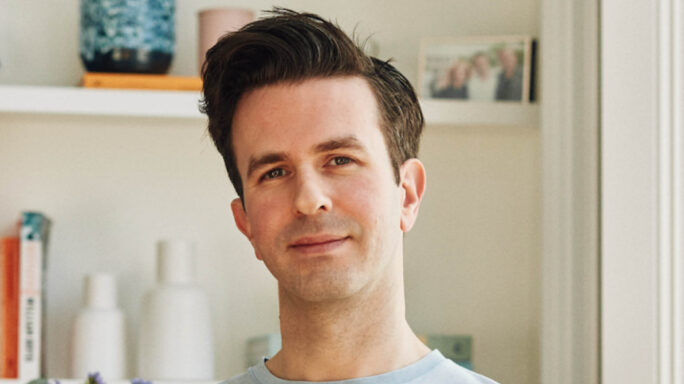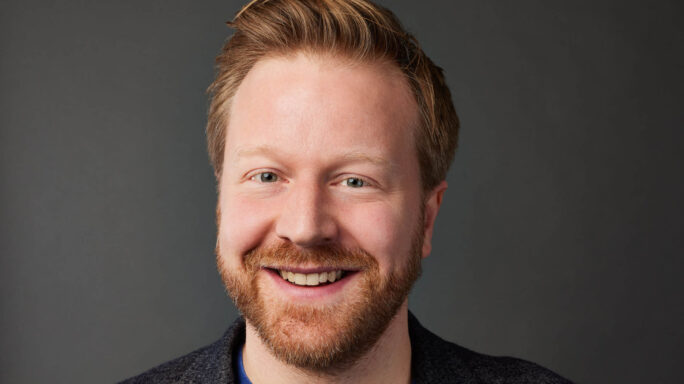Growth & Customers
Trade secrets to building a plumbing side hustle
Learn about how Rob Abrahams retrained in his spare time as a plumber and ran a side hustle before taking the leap to set up RJA Plumbing.

Never miss an episode
Subscribe to the Sound Advice podcast
Subscribe by email and get the Sound Advice podcast delivered to your inbox every month with a ton of related articles, templates and problem solving guides for small businesses so you can put our Sound Advice podcast into practice.
Have you ever thought, “Am I in the wrong business? Should I learn a trade?”
You’re not alone. The idea of becoming a carpenter, roofer, plumber, or fitter is very tempting. There’ll always be demand for your services, pay is pretty good, and you work with your hands.
Disillusioned by the 9-5, barristers clerk Rob Abrahams retrained in his spare time as a plumber and ran a side hustle before taking the leap to set up RJA Plumbing.
Read on to learn what it takes to succeed in a trades-based business.
Research the trade, find out what qualifications you need, and speak to somebody doing it
Decide whether an apprenticeship or private course is suitable for you
As well as training, you may need to spend money on tools
A course will probably not prepare you for running a business
When first starting as a tradesperson, you may need to supplement your income
If a job is beyond your capabilities, call in support
Public liability is a must, and an accountant can be worth their weight in gold
Plumbing offers a lot of variety
Customers are becoming increasingly cost-conscious
Think very carefully before offering an emergency service
As your business grows, look at whether employing people will benefit you
Your reputation is your livelihood, especially on social media
As you get older, you may want to take a more backroom role
You must be adaptable, perseverant and likeable
You need to enjoy problem-solving
Plumbing is a tough gig but very rewarding
In the beginning, you could save a lot of money by handling your finances
Making the jump to plumbing
Bex Burn-Callander:
Rob, tell us, how did you end up going from the law to plumbing? That’s a massive jump.
Give us the backstory.
Rob Abrahams:
I started as a barristers’ clerk when I was 17, right at the bottom as a junior clerk, doing a lot of running around.
At around 25 or 26, I became a senior clerk, which I was relatively young for. It was all good, and I was enjoying the job.
But over time, the job was changing beyond recognition.
Legal Aid was dying. It was becoming much more admin and tender based.
I could see that where it was going was not where I wanted to be. I just disliked it more and more every day. I was coming home every night and moaning, “I can’t do this anymore. The job is not what I signed up for.”
I decided to do something about it.
I looked around. Plumbing wasn’t my first choice, and I looked to other industries first. But because I earned a certain amount of money and had a family, I couldn’t afford to drop too much in money.
I’ve always been handy and did things around the house. Then plumbing came up in a random conversation with a friend of mine, so I investigated it a little more, realised I could make the jump, and did.
Research the trade, find out what qualifications you need, and speak to somebody doing it
Bex Burn-Callander:
What research did you do? How did you find out how much a plumber can make in a year?
You said you didn’t want to take a massive pay cut, as you’ve got a family. How did you do the research?
Rob Abrahams:
We had a plumber that was doing our stuff, and I made friends with him. I said, “Are you happy for me to come out with you and carry your tools? I don’t want any money. I’ll do it unpaid.”
As a tradesman, he was more than happy to have me on board.
I think I took about three or four days off work, just to follow him to see if I’d like it. Unpaid, just to carry his tools and go to jobs with him.
I realised that I loved it, and my friend said he’d help me along the way. It was a case of finding out how to get my qualifications.
I researched and found this City and Guilds level 2 course, which could take anything between six months and two years, depending on how fast you could do it.
Because I had a job at the time, it took me 18 months because I couldn’t afford to stop work.
I had to do it alongside my job.
I also had this other plumber that I’d go out with and learn from again on weekends. I would finish work at six in the city, come home, and go straight out again with him.
You just pick things up.
Over the 18 months, I had to pass several one-week exams. In the end, I had my qualification and made the jump.
I knew financially it would be challenging for the first year, but I just had to do it.
Decide whether an apprenticeship or private course is suitable for you
Bex Burn-Callander:
Did you have to have any basic qualifications before?
Do you need to have maths, or can you start with a blank slate?
Rob Abrahams:
I started with a blank slate.
If you’re young enough, it’s ideal and preferential to go to college and get an apprenticeship. If you’re somebody of my age or older and have a family, the apprenticeship might not work for you.
I couldn’t afford to do it this way.
I imagine most people who will make the jump like me can’t afford to not work for one year with an apprenticeship.
So, you can do private courses where you get the same qualification, but it’s very much on you. You have to do the work. It’s all paperwork.
There are books you have to read, and then you have exams you send via email. If you don’t pass them, you don’t get to the next level.
It was very work-intensive.
I was lucky. Every lunchtime for over a year, I would go downstairs for my lunch break and say I’d go to a conference room, shut it and study.
As well as training, you may need to spend money on tools
Bex Burn-Callander:
How expensive are these courses?
Rob Abrahams:
Eight years ago, it was about under five grand, so a bit of an investment.
And with that £5,000, you’d get the chance, not the guarantee, of this level 2 City and Guilds, which is the one below the gas qualification, which you have the option to do afterwards.
It’s probably a bit more expensive now. You can’t just decide you want to be a plumber. You have to invest. And then you’re going to have to invest in a van and tools.
For the first four or five months after I passed, I didn’t have a van. I just used my car.
A van is necessary at some point. But when you first start, don’t put yourself under too much pressure to get a van. Just get the jobs, do them right, and start building up a name.
That’s the first thing you do.
You need tools. You may spend around £1,500 to £2,000 on basic tools such as your drill, drill bits, and hand tools, as well as specific plumbing equipment. It’ll add up.
Everyone’s going to have different budgets. But I would say to begin with you’ve got to pay for your course, which will be somewhere between £5,000 and £7,000.
You have to have a bit of money put aside for your tools. In total, about £10,000 is not unrealistic. You’d have to think of getting a van at some point, but I wouldn’t go crazy on that.
A course will probably not prepare you for running a business
Bex Burn-Callander:
When you pass, it’s a whole new challenge. You’ve got the qualification, but now you have to build a business from it, which is a whole different skill set.
Do they teach you some of that when you’re doing your City and Guilds, or do you have to learn all of that on the job?
Rob Abrahams:
No. That’s the scary part.
The course was purely based on the practical, science and plumbing side. They don’t teach you anything about running a business or getting work. That’s down to you, and that’s the hardest part.
I handed in my notice and said, “It’s now or never”.
I then had three months to start putting myself out there.
I relied on friends and family first. You tell everyone that you’re a plumber. It’s not even about the money. You ask people if you can do something for them, such as fix a leak.
That gives you a little bit of trust.
I did get a part-time job to supplement my income working in an office three days a week, so the pressure wasn’t terrible. I planned to do those three days a week to earn something, and then two days trying to fill my diary as much as possible.
That was difficult because plumbing is reactive. If somebody has a leak or blockage, they need you now.
But I managed it, and it took the pressure off slightly. If you make a jump like this cold turkey and need to fill up five days.
What I did was ring estate agents and asked if they were looking for people, which worked. I picked up two estate agents that I’m still working for today.
I then joined a networking group, which initially served me well. That’s another investment.
If you’re strapped for cash, it can be a little bit difficult. But it’s just layers. You do a good job for one person then, and then in the world of social media, you will get put forward very quickly with somebody else.
When first starting as a tradesperson, you may need to supplement your income
Bex Burn-Callander:
Everyone needs to know a good plumber. And if you’re good, people won’t want to lose you.
If you can build up your client book over time, you know there’ll always be repeat business, and they’ll recommend you to their friends.
It’s just how long you survive while your reputation gets out there.
So how long did it take you before you could move to five days a week or even possibly seven days a week, plumbing?
Rob Abrahams:
It didn’t take me that long.
In my head, I was going to work the office job for about six months. But I think after about three months, I found myself filling three days. And then I was almost filling four days.
Especially at the beginning, it’s not so much about being good because you’ve got so much to learn with plumbing.
It’s about being honest.
I had jobs where I must have gone back four, five, six times sometimes because I didn’t have the experience to know the problem at the time.
People respect the fact that you are new at it.
If you don’t charge every time you go back, there is a certain amount of leeway that people will give you.
And then your reputation grows.
In the beginning, you’ve got to say to yourself, “I’m going to make mistakes. I am going to have to go back on jobs three or four times, and financially, it’s going to be very, very difficult.”
If you can get your head around that, your reputation will grow, and people will like you.
And then, after a year out there, you are becoming good and better.
The other trick is, especially at the beginning, is to know your limits and limitations. I’ve seen some plumbers make an awful mess.
So, in the beginning, I was careful about what I took and what I didn’t take and only concentrated on the small jobs—such as toilets, sinks and blockages. There was only so much you could do with that, so I turned down a lot.
There were a lot of jobs that I turned down because of the risk.
One job I remember, there was a toilet, and I just could not get it to stop leaking. I must’ve gone back six or seven times at least.
In the end, it was the simplest thing, and I know what the problem is now. I must’ve done 300 of them since.
I remember coming home and sitting with the missus, saying, “I can’t do this. It’s not for me.”
You’ve just got to be able to get it done and crack on. Now I can do these toilets with my eyes closed.
The other trick is making friends.
There are a lot of people in our industry. And at the beginning, I made friends with two or three people that I knew had much more experience than me.
If I was struggling on a job, I’d phone them up and would pay them. Plumbers don’t do anything for free—even my friends.
The client’s happy, and you’re out of pocket, but it doesn’t matter initially. You’re just building up a clientele. There are a few times I called out people.
If a job is beyond your capabilities, call in support
Bex Burn-Callander:
They would come and help you out, but they would get the money from the client, and you would just forego everything? Smart.
And you’ve learned how to do something, so it’s like training?
Rob Abrahams:
It’s like driving a car. You learn to pass the test, but then you’ve got to learn to drive, which is a big thing. You qualify, but there is so much to know about plumbing.
Anyone who wants to make this jump must remember that you’re not a plumber once you’ve got your qualification. You will spend the next couple of years building up as much information as possible, making as many friends as you can, and just learning as much as you can on the job.
I made a few good plumber friends I’d met along the way. They knew they weren’t coming to help me out as a freebie. They were going to get it rewarded financially.
It was challenging and is going to be hard. But it’s worth it.
Public liability is a must, and an accountant can be worth their weight in gold
Bex Burn-Callander:
You said that the scary bit was building the business.
What did you do first? Did you create a business plan?
Did you get an accountant?
Were you learning all of that at the same time as trying to get new clients in?
Rob Abrahams:
I’m not the best example, as I didn’t write a business plan.
I went in headfirst, and I suggest that’s probably not the best way of doing it. I think if you get a business plan in place, it’s better.
But for me, I was going to do it now, or I’d never do it.
But what I did was get an excellent accountant. That’s another expense, but they’re worth their weight in gold.
There’s so much to know about running a business, with tax and the things you buy.
If you have the time, then you should learn about taxes. I didn’t at the time because I was changing careers and managing a family.
I’ve got friends of mine who do all their books, and that’s fine. I don’t because I’d rather use an accountant. You lose the costs within the business, and he does everything for you.
The first thing you need to do is protect yourself, so the public liability is an absolute must for anyone who’s thinking of making the jump, and it’s their first day of trading.
Touch wood, I’ve never had to use it, but you need it.
You’re going to need an accountant, and you need to know how to do invoices. I’ve done all my invoices for the last seven years.
I’ve only just passed that over to somebody else purely to save time.
You need to have a good way of doing invoices with a good header sheet and wording. Because when you do quotes as well, it’s good to be organised and professional.
I think signed uniforms always look good, and I see many people who don’t wear them.
It’s all about first impressions.
You turn up looking smart, whether you’re a plumber, decorator, or plasterer, and they trust you.
Then you’ve just got to put yourself out there and say yes to pretty much everything.
Plumbing offers a lot of variety
Bex Burn-Callander:
You said that when you first spent a few days with that plumber, and when you were thinking about becoming a plumber yourself, you said you enjoyed it.
So tell me what you love about the job.
Rob Abrahams:
I remember it clearly, like yesterday. I spent the first few days with him, and maybe I got lucky—every job was different, and I loved that.
The first day started with a leaky bath, and the second job was a leak in a loft with a tank.
And then the third job was something different.
I remember thinking to myself, “I go to work every day, and I could do it blindfolded. It’s boring. I hate the people that I work with.”
And there’s nothing there—like I was coming home dead. It was boring.
And with plumbing, every day was different.
Overall all the clients were happy to see you. It’s a nice feeling, especially when you leave a job and something’s working.
I remember coming out of those days buzzing. I knew this was for me.
I could see myself doing a variety of jobs, interacting with clients, and I liked that.
Some people think I’m nuts, but it’s satisfying.
I don’t do gas, but I do pretty much everything else. The variation is huge.
I can have a day of five or six jobs, and each one is different. The satisfaction I get from unblocking a drain full of mess and seeing it all go away—magic, I love it. It’s quality.
Like a couple of days ago, I had an old lady who had a bathtub she hadn’t been able to use for months, and it wasn’t a tough job.
I did it, and she was so lovely. Bless her. She gave me a pound on the way out. It’s things like that.
It’s just that there was none of that in my previous life as a barristers’ clerk. It was a very cut-throat, everyone there for themselves kind of environment. Plumbing is very different.
Bex Burn-Callander:
You’re a key worker. So were you out and about, even when the whole world was locked down? Because you’re an emergency service.
Rob Abrahams:
In the beginning, for the first few months, I stayed at home.
I felt pretty bad about that, as I was getting calls quite a lot.
But I went to work for two reasons.
One—the home schooling was killing me, and I had to get out.
And two, as you said, we were allowed and almost encouraged as plumbers to carry on as usual.
I never really stopped through both lockdowns. My days were similar to what they were usually.
Bex Burn-Callander:
I bet with a lot of people who were isolating or elderly, you might’ve been the only person they’d speak to that day.
That must have been interesting. You’re a plumber, but you’re could also be a counsellor or loneliness prevention officer.
Rob Abrahams:
Yeah. It was fascinating how people dealt with it differently. I remember going into one house, which made me laugh because, and I’m certainly not making light of people’s nervousness because they had the right to be nervous due to coronavirus, but it was almost like I’d walked into a crime scene.
They’d laid out sheets for me to walk on and covered everything up.
It went from one extreme to the other, where I’d go into some houses, and they didn’t care. Everyone had very different levels of tolerance, so that was interesting.
But overall, it was nice because people were more grateful than they were usually. It was a strange time.
Customers are becoming increasingly cost-conscious
Bex Burn-Callander:
I’ve asked you what you love about your job, but I want to know what you hate.
I thought it was going to be something to do with sewage. But you told me you loved unblocking a pipe.
So what do you dislike?
Rob Abrahams:
Honestly, it doesn’t bother me. What do I dislike?
OK, so the most challenging thing now is, and I find this more and more now, is that many clients are getting very cost-conscious.
Nine times out of 10, I’d go and pick them up a decent tap. Not an expensive tap, but a tap that I know is a reputable brand.
A lot of people now are buying taps off the internet, and the quality is poor. So, when you go to fit it, three weeks later, you’re getting a callback. I’m having that more and more.
The client says, “Well, I’ve got to pay you to come back again.”
And I reply, well yes, because I didn’t supply the tap. The tap is from China. It’s pretty rubbish.”
Fitting rubbish stuff is a problem on my end. I’m a bit snobby. Shower pumps are expensive, and I will only fit a specific shower pump. I won’t fit any others.
I’ve lost jobs on the back of that because I know I will get called back with a problematic pump.
Clients can be demanding.
I suppose the nature of plumbing is that you don’t know how long a specific job will take. You can organise your diary to the best of your ability, but you can get a job that should take you 20 minutes, and you’re there for four hours.
That’s just plumbing.
You fix one pipe, and depending on the age of the pipes, the other pipe down there goes wrong. And then, all of a sudden, you’ve got to phone around and tell people you’re going to run late.
Some people get it, and some don’t. That’s not easy.
I suppose I’m working harder now than I’ve ever worked before.
So, anyone who thinks being self-employed is a dream—I promise you it is brilliant, but you will work harder than you will ever have worked in your office job.
That can sometimes be tiresome.
Think very carefully before offering an emergency service
Bex Burn-Callander:
How do you manage your hours?
Because you can make so much more money as a plumber, I hear, if you do emergency jobs, because you can charge a lot more.
But then that means you must be picking up the phone at two in the morning or Sunday night, for example.
Do you do that, or do you have specific slots of time where you say, “I’m free for emergency work?”
Rob Abrahams:
Yeah, some plumbers do that.
I don’t put myself out there as an emergency plumber. You must be very careful when you do that because I’m on my own.
If you set yourself as an emergency plumber and you’re not available, then it’s a problem.
I tend to work from seven or even earlier in the morning, and sometimes I don’t get home until eight or nine. I don’t work weekends, and once I’m home, I’m home.
Don’t get me wrong. If the phone goes and it’s a client that I know and is local, then nine times out of 10, if I can, and the wife’s OK, I’ll go.
But with young families, it’s not always easy to do that.
Most of the emergency plumbers you’ll find are part of a bigger company, so they can do shift work as they know they’re on call.
With your average one-person band, it’s slightly harder to put yourself out there as an emergency plumber.
As your business grows, look at whether employing people will benefit you
Bex Burn-Callander:
Are you still a one-person band?
And do you intend to stay that way, or would you like to grow your business and take on more plumbers?
What are your ambitions?
Rob Abrahams:
I don’t want to be changing toilets until I’m 65. So, the goal is to have somebody, or a few vans, working within a proper business.
I am lucky that I have a few people now with me. We don’t employ, but we subcontract out.
I’m booked up until the end of November, purely on bathrooms. Within that group, I subcontract two or three guys regularly. They’re not plumbers, but tilers, carpenters, and painters.
On the plumbing front, the plan is at some point to employ someone.
Bex Burn-Callander:
Employ someone who’s already trained or an apprentice?
Rob Abrahams:
Yes. Well, I’m still toying with that. It’s a difficult one. I’ve had so many conversations with friends of mine about it.
The problem with having an apprentice is that it will take three or four years to get them to a certain point, and there’s no guarantee they will then stay with you.
If I can find someone who’s qualified and almost a carbon copy of myself, who has done four or five years and is trustworthy enough to put in people’s houses—that’s the other problem.
You must find someone you trust as much as you trust yourself because you’re leaving these people in houses.
My reputation is excellent. But with the power of social media, if you have somebody with an RJA Plumbing Solutions shirt on who doesn’t live up to my standards, then it’s difficult.
I am toying towards making an investment and employing somebody with a bit of experience. Then suddenly, I’ve got two vans on the road.
Your reputation is your livelihood, especially on social media
Bex Burn-Callander:
Because you’ve got your name above the door, there’s nowhere to hide.
Do you thrive off that?
Rob Abrahams:
I think you must, because if you don’t, then it’s a challenging ride for you. I think it’s the same for all self-employed people. It’s your name. I keep arching back to social media—I get a lot of work from Facebook and neighbourhood groups. Purely recommendations.
For me, it works well. But I’ve also seen it in Facebook groups where clients are ripping apart people that haven’t turned up, or they’ve done this, and they’ve done that.
That drives you.
You want to do a good job, but the fear of being tarnished also drives you. When you’re self-employed, your name is who you are.
As you get older, you may want to take a more backroom role
Bex Burn-Callander:
When you said you don’t want to be unblocking toilets at 65, would you retire and just be the major shareholder in the business?
Or would you be more office-based? What role would you move into?
Rob Abrahams:
Ideally, I’d love to go around looking at the jobs and pricing them—more backroom stuff.
I’d have two or three guys who would go out while I’d go out and price them.
I could still see myself being on the tools when I’m 65 because I’m pretty active and can’t imagine not working. But I certainly don’t want to be working as physically hard as I am now.
That’s the other thing with plumbing. It is very physically demanding. You could be out at a block of flats, and you’ve got to carry your toolbox. It’s, physically, very full-on. I’m in my early 40s. In the next five years, I want to have somebody employed to share the load.
If that goes to plan, you can get another van. And then, all of a sudden, you’ve got a real business.
You must be adaptable, perseverant and likeable
Bex Burn-Callander:
Who would make a good plumber? You’ve said they must be physically fit. You can’t be shying away from walking up 15 flights of stairs with your toolbox.
But in terms of attributes and characteristics, what would people need to be a good plumber?
Rob Abrahams:
So for me, there are two layers to this question. You’ve got the practical side of it and the personality side.
On a practical front, you’ve got to be just incredibly adaptive and perseverant.
Plumbing can be rough. You must persevere, persevere, persevere. You must have that in you to not give up on things.
I think you must be very likeable.
A lot of plumbers, especially with older ones, personal skills can be lacking if I’m honest.
The new breed is slightly more likeable and interactive.
You must be very organised. The one skill I took from my previous life in law was organisation.
My diary is probably my most important tool. Every phone call you take, you make a note of their name, phone number and address.
You give out time estimates to jobs as best you can.
If you are running late on a job, you think, “Right. You make five calls to customers or how many you’ve got in the day. You say, “Look, I’m running behind.”
And that is priceless.
You’ve got to do that now. People will wait for you if they’re expecting you.
And if you don’t turn up, it always amazes me when you hear clients say, “I waited in for a plumber, or “A plumber never gave me a quote.” To me, that’s alien.
You need to enjoy problem-solving
Bex Burn-Callander:
Do you think you need to be a problem solver? Because you must be someone that sees something as broken and likes to fix things?
Or can that be just learned, even if it’s not innate?
Rob Abrahams:
I do think you need to have a problem-solving brain. You learn the basics and the science.
But once you’re on the job, there can be 10 or 20 different ways to overcome a problem.
The number of times you’re at a job thinking that the techniques from the books you have read or somebody has taught you aren’t going to work.
You’ve got to remember that every house is different.
Every house has been built at a different time, by a different person, from different countries, and in different ways. You can get to a house where the plumbing is alien, and nothing makes sense.
You try and pick it out bit by bit and work out what you can do.
That’s the fun part.
Don’t get me wrong. It can also drive you nuts. But there must be an ability to problem solve and enjoy it within you. There may be so many different angles to come from, and you may have to try five of them before the sixth one works.
That’s the other thing. You must be able to say to yourself, “I’m not going to leave this house until this is done.”
Or phone a friend—one of the two.
I don’t do gas, and I’ve got a very good friend who does nothing but gas. He does all the boilers.
When you decide to make the jump, you must work out what kind of plumber you’re going to be. That’s important because you’ve got so many different types of plumber.
You’ve got the gas plumber who will only do gas.
I could do my gas qualification in about four weeks. Because I’ve got my level 2, I could become gas-safe if I wanted.
The reality is, I wouldn’t have a clue how to fix a boiler. These guys have trained and looked at boilers for 10 years. I’d have a whole lot more to learn, to do it properly and safely.
For me, that’s not an option.
But the gas guys don’t want to come and change taps and unblock sinks. They wouldn’t have a clue what to do with shower valves.
And that’s OK because that’s not their thing.
Some plumbers just lay pipes on new builds. Not for me, because I couldn’t do it on a building site. Too many people would drive me nuts.
Work out where you want to be, and that’s half the battle. Don’t try and do it all.
Plumbing is a tough gig but very rewarding
Bex Burn-Callander:
And do you think that, for anyone listening looking to retrain, that plumbing is a great trade to choose?
Is it very competitive? Are there other trades where there’s a lot more demand and not enough supply?
Rob Abrahams:
I’d say it’s as competitive as any other trade.
But I would say it’s probably more rewarding than any other trade. I think it’s probably one of the hardest trades—many people do not stay in plumbing for that very reason.
You got to be prepared to put it in. It’s not an easy trade, but it’s an incredibly rewarding one. I love it.
Bex Burn-Callander:
How do you set your pricing?
With a plumber, you’re not paying them for what they’re doing. You’re paying them for what they know like that family, where you save them about £1,000 because you knew how to change this cartridge. It’s not even how long you’re there. It’s the fact that you knew what to do.
So how do you go about pricing yourself?
Rob Abrahams:
It’s precisely that, and not everyone does get that.
I have an hourly rate which is, I think, a competitive one. It’s slightly below what you’d expect to pay a gas engineer because I’m not competing with them.
But it’s bang on, I think, what you’d expect to pay a plumber.
On some jobs, especially with blocked drains, I have a set price. If it’s an outside drain, I have a set price and say, “Right, this is what it’s going to cost for the first hour, and then after that, that’s what it’s going to cost for the second hour.”
If I can’t do it within two hours, then you’re going to need the big trucks.
That doesn’t happen very often, but I say that I don’t charge.
I’m unusual in that respect. If I can’t fix something, I’ve been to your house, and for whatever reason, you need the next level up, I will take it on the chin.
I won’t charge you, and I’ll move on because I just think that makes me feel more comfortable.
Not everyone does that, and nor should they, but that’s just the way I do things.
There are good clients, and if I’ve been around there and it’s a first or second job, I won’t bill in the whole hourly rate. I’ll just say, “Right, this is what it is.” You must be able to feel the situation at the time.
In the beginning, you could save a lot of money by handling your own finances
Bex Burn-Callander:
What do you wish you’d known before you made the jump?
Was there any extra course you wish you’d done or anything that you wish you’d understood better before you made the leap and started your company?
Rob Abrahams:
I would have been more prepared if I realised just how hard it was and how long the hours would be.
The hours are harder if you want to make a decent living.
Where I was working before at my cushy little desk, it was nine to five. Also, the time you have to allow getting to places, I would have considered that.
I can’t think of anything significant or different.
I think any advice I’d give my younger self would be around learning more about the tax and everything else that goes into it.
I think I spent a lot of money ignoring that and getting the accountant to do it all, especially at the beginning. That’s fine, but I think if you have the time, work out your finances because you can save a fortune.
I’ve got friends of mine who do all their books. They’re not that difficult, and if you could do that, it’s probably preferable.
Bex Burn-Callander:
What’s your catchment area? Because you said travel. You’re in north London.
Do you stick to the north, or do you go south of the river? How do you set your area?
Rob Abrahams:
I’m not too precious, to be honest with you. I tend to work mainly in north London because that’s where my reputation is.
I did a lot in central London before coronavirus hit, so I got rid of my old van and invested in an electric van.
Unfortunately, I lost the biggest contract I had with this American student housing place because none came over. So that was a massive blow.
As it turns out, the electric van’s good and I’m still going to town.
I quite enjoy going into central London. I tend not to go south of the river, unless it’s a very attractive job, because, unless I’m doing a bathroom, most of my jobs are one or two hours.
If it takes me an hour or two hours to get there, it’s just not worth it.
But having said that, I have quoted for bathrooms in Hammersmith before because it can be worth it.
Bex Burn-Callander:
I thought I’d ask that question because I have a feeling that anyone listening, who needs a plumber, is going to listen to your voice, listen to your approach on plumbing and say, “I want that man.”
So now you know where he is. You know how far he travels.
Are you thinking of getting into the construction trade?
Wherever you’re listening or watching, subscribe to Sound Advice on Apple iTunes here.
We are also on Spotify and anywhere else you get your podcasts.
We would love for you to join our community to share your insights and stories, take your recommendations for guests, and even ask some questions you would like us to ask in the future.
Let us know on Twitter @SageIreland using the hashtag #SoundAdvicePodcast, on Instagram @SageOfficial at or in the comments below, and we will get back to you.
To get in touch with Rob, you can contact him at [email protected].
Side hustle toolkit
Get your free guide, business plan template and cash flow forecast template to help you boss your side hustle and achieve your goals.

Never miss an episode
Subscribe by email and get Sound Advice delivered to your inbox every month with the Sage Advice newsletter with a ton of related articles, templates and problem-solving guides for small businesses so you can put our sound advice into practice.










Ask the author a question or share your advice